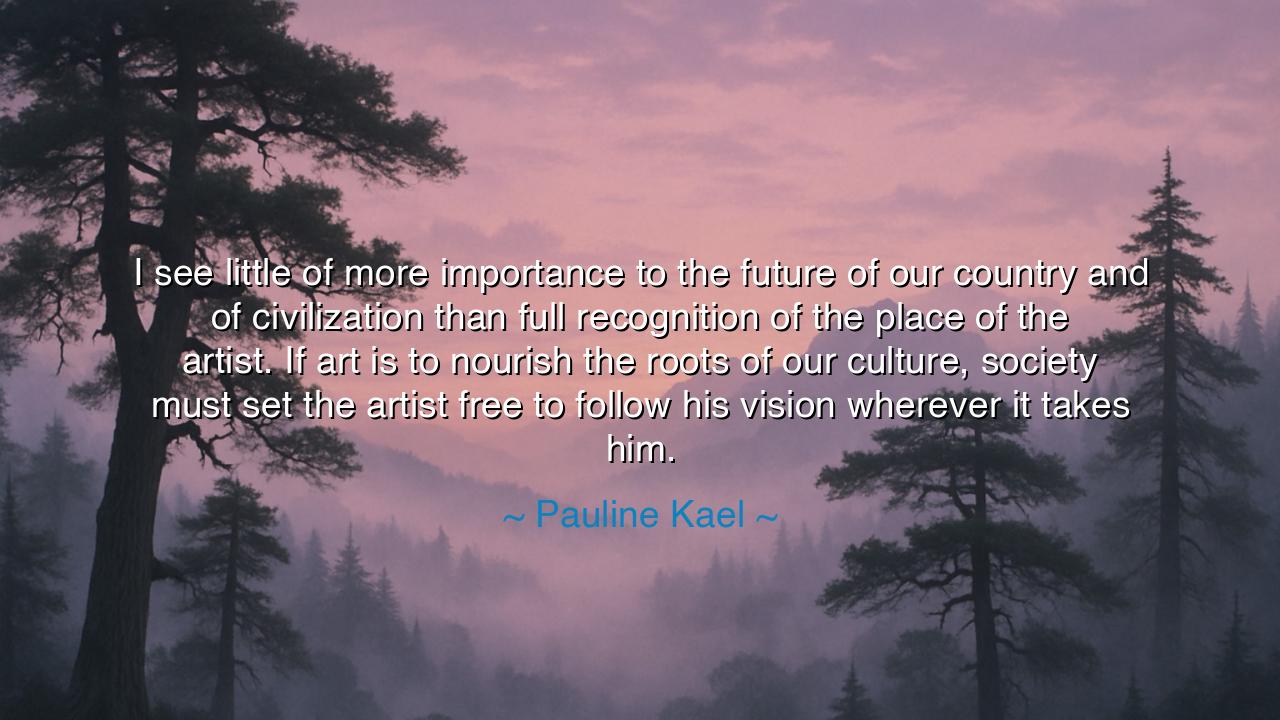
I see little of more importance to the future of our country and
I see little of more importance to the future of our country and of civilization than full recognition of the place of the artist. If art is to nourish the roots of our culture, society must set the artist free to follow his vision wherever it takes him.






Hear the resounding words of Pauline Kael: “I see little of more importance to the future of our country and of civilization than full recognition of the place of the artist. If art is to nourish the roots of our culture, society must set the artist free to follow his vision wherever it takes him.” This saying is no mere reflection on beauty or ornament, but a proclamation of destiny. It declares that the very future of civilization depends upon the breath of the artist, that the roots of culture grow not from laws and armies alone, but from imagination, vision, and creation unbound.
The origin of these words lies in Kael’s vocation as one of the great film critics of her age. She saw with piercing clarity that cinema and art were not trifles of entertainment but mirrors of humanity’s soul. In her time, she fought to defend the independence of the artist against the weight of commercialism, censorship, and political pressure. Her words remind us that whenever the artist is shackled, the culture itself withers, for the river of creativity is the lifeblood of civilization. To nourish the roots of culture, society must not chain its dreamers but free them to wander where vision calls.
The ancients knew this truth well. Consider the tale of Pericles of Athens, who declared that a city is not judged by its walls, nor by the number of its ships, but by the brilliance of its artists and the endurance of its culture. In the golden age of Athens, sculptors carved gods into stone, playwrights gave voice to tragedy and comedy, and philosophers raised questions that echo to this day. This flourishing was possible only because artists were free to follow their vision. And behold: though empires have crumbled and kings forgotten, the words of Sophocles and the statues of Phidias remain immortal, nourishing even now the roots of our shared humanity.
History also gives us warning when the artist is silenced. Recall the dark days of totalitarian regimes, when the brush was broken, the pen was seized, the song was silenced. When Hitler sought to erase modern art as “degenerate,” he struck not only at canvases but at the very soul of a people. In such barren soil, culture withers, and the future grows bleak. Contrast this with the story of Russia’s great composers—Tchaikovsky, Shostakovich—who, even under oppression, managed to smuggle truth into their symphonies, keeping alive a flame of freedom that audiences still feel today. From this we learn: society thrives when the artist is free, and decays when he is chained.
The meaning of Kael’s words, then, is both heroic and urgent: art is no luxury, no decoration. It is the sustenance of the human spirit, the foundation upon which civilization rises. Without it, nations may have power but no soul, wealth but no wisdom, armies but no vision. To deny the artist is to deny the very roots of our humanity; to set the artist free is to ensure that culture blossoms and carries its fragrance into future generations.
And what lesson shall we, who walk in her shadow, take from this teaching? That each of us must honor the artist’s place in society, not by demanding conformity but by guarding freedom. Let us support the creators who dare to challenge, inspire, and awaken us. Let us fund the arts, attend performances, read poetry, and defend expression even when it unsettles. For art’s task is not always to soothe, but often to disturb, to reveal truths hidden in shadow.
Thus, children of the future, remember: do not bind the artist—unleash him. Do not silence the poet—listen. Do not scorn the dreamer—follow him. For in their visions lie the seeds of your culture, and in their courage lies the destiny of your civilization. Let every society that seeks greatness carve this truth upon its heart: that to set the artist free is to secure the life of the spirit, and to secure the life of the spirit is to ensure that humanity shall endure.






AAdministratorAdministrator
Welcome, honored guests. Please leave a comment, we will respond soon